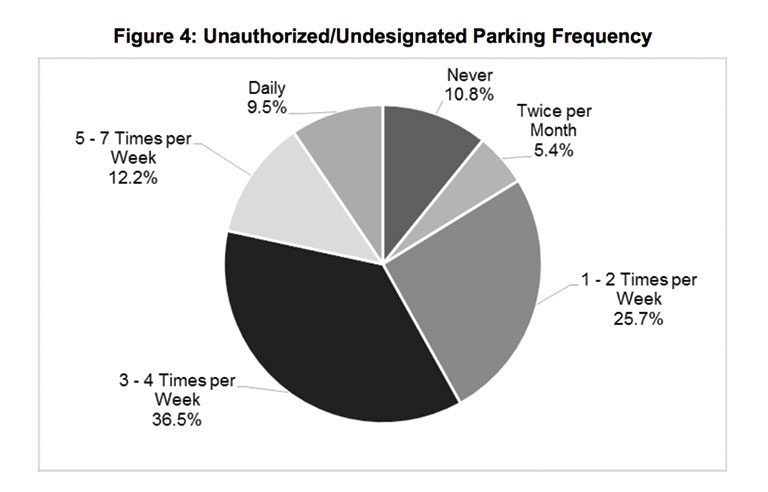Many truck drivers forced to park illegally: survey

Photo: American Transportation Research Institute
Arlington, VA – A lack of safe, available parking spaces forces many commercial motor vehicle drivers to stop in undesignated or unauthorized areas such as highway shoulders and ramps, according to the results of a survey conducted by the American Transportation Research Institute – the research arm of the American Trucking Associations.
Nearly 150 drivers submitted diaries detailing their parking experiences, chronicling more than 4,700 parking stops in a 14-day span. Drivers reported that available parking was particularly scarce between 4 p.m. and midnight, and non-CMVs often occupied more than one-third of the designated truck parking spaces.
Drivers recorded how often they were forced to park in unauthorized or undesignated parking spaces:
- Every day: 9.5 percent
- Five to seven times per week: 12.2 percent
- Three to four times per week: 36.5 percent
- One to two times per week: 25.7 percent
- Twice per month: 5.4 percent
- Never: 10.8 percent
Research also showed drivers lost an average of 56 minutes of revenue drive time daily looking for parking, equating to an annual wage loss of $4,600.
“The lack of available truck parking creates a lot of stress for me and my fellow drivers,” professional driver Stephanie Klang said in a Dec. 13 press release. “And, as ATRI’s diary research shows, it’s a number of things – from lack of capacity, concerns over running out of hours, time limitations on parking in public rest areas and customers not letting us park in their facilities – that all combines to make this a perennial issue for us.”
ATRI stated that drivers could benefit from searching for parking during off-peak hours from 5 a.m. to 4 p.m. Additional weekend shifts also could help because parking demand is lower on Saturdays and Sundays. Meanwhile, motor carriers could improve the situation by paying reservation fees for drivers and allowing drivers to have more flexibility in appointment times with shippers and receivers.
Post a comment to this article
Safety+Health welcomes comments that promote respectful dialogue. Please stay on topic. Comments that contain personal attacks, profanity or abusive language – or those aggressively promoting products or services – will be removed. We reserve the right to determine which comments violate our comment policy. (Anonymous comments are welcome; merely skip the “name” field in the comment box. An email address is required but will not be included with your comment.)

